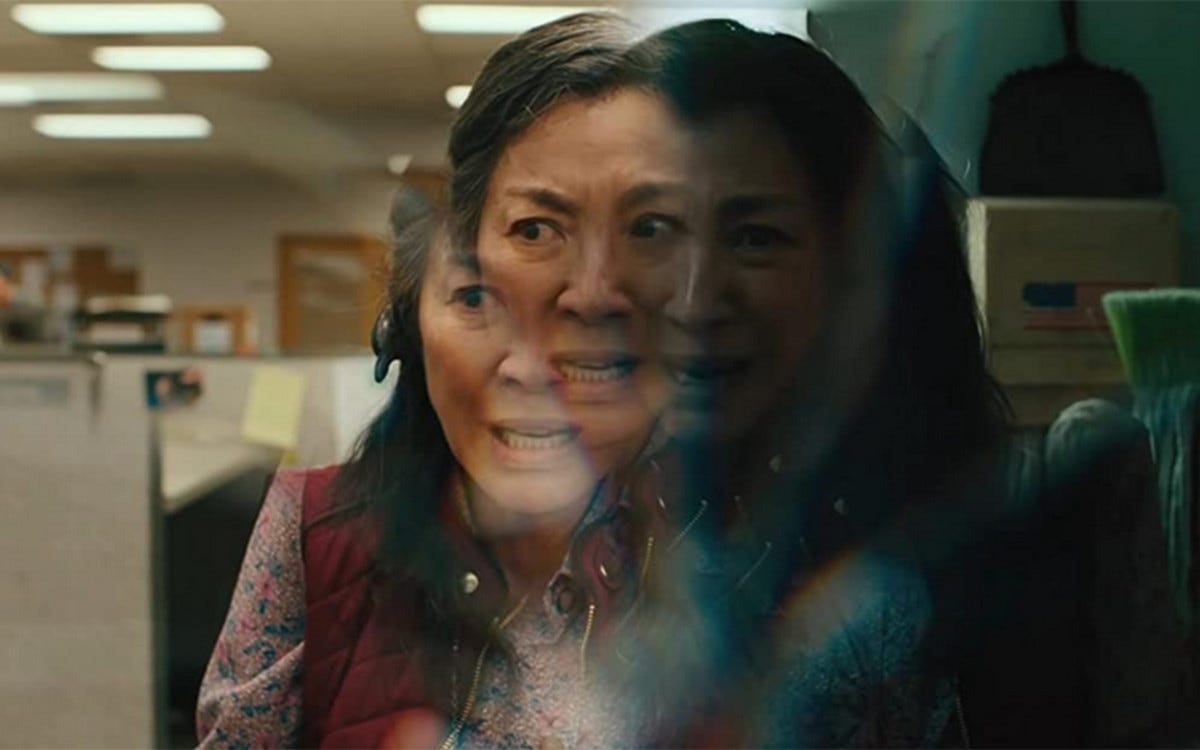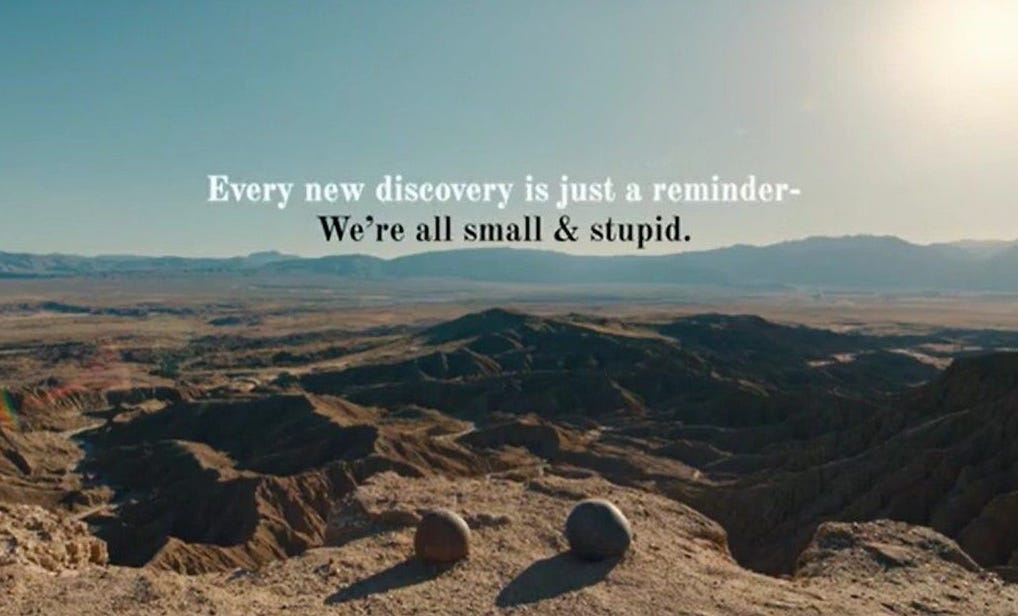You Can't Do Everything Everywhere All at Once
5 Ways to Resist a Culture of Perpetual Overwork and Instead Focus on What Matters Most
Hey Changemakers!
I always appreciate the power of a good seasonal change to help us reset and recalibrate. As I wrote this, we’re transitioning to spring here in the Pacific Northwest (with our typical rain as well as the explosion of greens and spring flowers). I’m a big fan of embracing any opportunity to take a step back from our work and our lives (especially when we might feel like we’re in a rut) and just notice how we feel about where things are right now.
As changemakers, these are great opportunities to assess our own practice: do we feel grounded and self assured in our change work, or do we feel overwhelmed and exhausted by the immensity of the work in front of us? Are we feeling like we’re being pulled in too many directions?
After watching the Oscar award-winning film Everything Everywhere All at Once for the first time, I remember my fascination with the film’s title—the sheer immensity and utter overwhelm of everything … everywhere … all at once. For me, the central character Evelyn, played by Michelle Yeoh, feels this daunting and extreme sense of overwhelm early in the film. She’s pulled and pushed in so many different directions in her life, and then she’s literally pushed and pulled into many different universes (I’m not going to go into detail here, so just watch the movie if you haven’t yet).
The movie’s title provides a powerful metaphor for the intense feeling of being pulled in so many directions all at once, and feeling the pressure of needing to do everything right now (even though we know we just can’t).
PRO TIP: You Can't Do Everything Everywhere All at Once
It’s so obvious, right? We can’t do it all. And certainly not right now.
Yet no matter how much this feels like basic common sense, so many of us are still falling into the trap of overwork and burnout. In working with individuals and non-profit organizations these past several years, I’ve been asked so many times, “how are we going to do it all?!?”
We’re adding new projects onto our workload without saying goodbye to other work; we’re hiring new staff and having to manage a bigger team without any more time or resources; we’re adding more and more in-person meetings and events to a schedule already filled with Zoom meetings; we’re adding new goals and priorities onto an already overflowing list of existing goals and priorities. All of a sudden, we’re stuck in the position of doing everything everywhere all at once.
In a recent interview about her new book Enchantment: Awakening Wonder in an Anxious Age, Katherine May called this the Burnout Decade, and in many ways, I think she’s spot on. This COVID burnout or “pandemic hangover,” as she calls it, is a bit of flattened reality marked by a sense of being “bored, restless, empty-headed, and bodily resistant to changing it.” As she notes, we live in a moment when if we actually do create boundaries for our work, we have decided to call it “quiet quitting.” So we’re basically equating a healthier, more balanced perspective on work with giving up and quitting. Yikes.
Amidst all of this, how do we actually pause, take a step back, and begin to interrupt this cycle of perpetual overwork—this cycle of always adding more and doing more? How can we gain a sense of control to change this?
Here are 5 ways you can meaningfully rethink how you see work and take action right away to address burnout:
1. Let’s Stop Celebrating Busy
At some point, celebrating being busy (and making a point to share this with colleagues and friends) became a thing. We’re all a little guilty of this at some point, walking into a meeting and bursting into a performative monologue about how many projects and deadlines we are burdened with. How unfair it all is. Woe is me!
And sometimes, it turns into a competition—others start chiming in about how unreasonably overworked they are (“oh yeah, I’m working like 70 hours a week right now,” or “I haven’t taken a vacation day in 4 years”). We say these things with a underlying sense of success and pride. Within the culture of busyness, there is an assumed weakness in slowing down, making time for family, or taking time to rest and take care of oneself.
In SO many workplaces, especially those where a scarcity mindset is dominant, this extreme level of overwork has long been a marker of value and importance. It’s a pervasive element of our society’s harmful productivity culture that equates busyness with success, and it leads to much of the burnout we see today. When we buy into this culture, we become a part of the problem.
Next time you notice this happening (with yourself or within your organization), I challenge you to stop celebrating busyness and interrupt this cycle. What would it feel like if we, instead, celebrated the moments when we set a work task aside or pushed a deadline back so we could spend more time with our family? What if we felt supported and valued when we took some things off our plate? How much more clarity, focus, and energy could we bring to our role as changemakers if we didn’t feel the pressure to be busy all the time?
2. Exercise Your Power of Choice
It is up to us to decide what we spend our time on, and what work receives our full attention. While it may not feel like it sometimes, we are in control of our own choices. As changemakers, we have to remind ourselves of this.
In his bestselling book Essentialism: The Disciplined Pursuit of Less, author Greg McKeown reminds us that “our ability to choose cannot be taken away or even given away—it can only be forgotten.” He writes:
“When we forget our ability to choose, we learn to be helpless. Drip by drip we allow our power to be taken away until we end up becoming a function of other people’s choices…. [W]hen we surrender our right to choose, we give others not just the power but also the explicit permission to choose for us.”
When we are feeling overwhelmed by our tasks, to-do lists, meeting schedule, and work projects piling up around us, it is important to ask ourselves how we got here. How many times did we let someone else choose this workload for us? How might we take action to change our situation and start making choices for ourselves again?
3. Practice Prioritizing
So when we do make choices for ourselves, what guides those decisions? Our priorities! These are the priorities that we decide upon based on our deeply held values, beliefs, and goals. What is the work we want to do.
McKeown writes, “If you don’t prioritize your life, someone else will.” In other words, if we don’t make our own choices and set out own boundaries, we end up allowing other people’s agendas to control our lives. Trust me, I’ve lived this—and I think most of us can relate to this. Our life becomes an everything bagel (yep, I slipped in another reference to Everything Everywhere All at Once).
As changemakers, when we are making our choices based on our priorities, we can better manage our workload and focus our time on the work that matters most to us. Will everything we do be super meaningful are connected to our core values? No, probably not. But we can prioritize the things that are meaningful to us, focus on those, do those first, and not get bogged down by the less meaningful things.
One of my favorite quotes from McKeown’s book is this: “Our highest priority is to protect our ability to prioritize.” Take a moment and reflect on this. Maybe even write up a list of everything on your plate at this very moment, and ask yourself, “What is most important right now?”
4. Saying “No” Allows Us to Say “Yes”
As human beings, we’re hardwired to make other people happy, so we gravitate toward always saying “yes,” even when we don’t really mean it. We say “yes” and take on new work, new projects, new responsibilities even when we know we can’t. I mean, are we even allowed to say “no”?
Here is the key thing: when we say “no,” it allows us to say “yes” to something else.
As changemakers, saying “no” is one of the most effective tools for setting boundaries and protecting the core work that matters most to us. Saying “yes” to everything leads to overload and overwork; but saying “no” to work that isn’t aligned with our core values and goals will help us focus our time and energy on the work that is the most meaningful.
When learning to say “no” more often, it’s important to also share the trade-offs involved. In each circumstance and situation, what are the benefits of saying “no”? What is the thinking behind our “no”? We should be transparent and provide the reasoning behind our decision to say “no.” This can help it feel less personal. And it’s also a good thing when we talk with others (regardless of hierarchy or management structures) about our workload and any concerns about burnout. A gracious “no” can go a long way.
Over the next week, practice gently saying “no” when you’re asked to take on new work, do a new project, add a meeting to your schedule, or anything that isn’t currently on your plate. Use it as an opportunity to decide if the new work aligns with your goals and values, or what the trade-offs would be if you said “yes.” And of course, be gracious and compassionate about your new superpower to say “no.”
If you are uncomfortable saying “no” (and I get that— it’s very normal & human), try to at least pause when you’re asked to take on a task or attend another meeting. Give yourself some time and space before responding, say “I’ll have to think about that and get back to you,” and prevent yourself from reverting to the automatic “yes.” You might find it easier to say “no, thank you” after you’ve had more time to reflect on what a “yes” would mean for your existing workload.
5. Just Be a Rock
Towards the end of the film Everything Everywhere All at Once, there is a poetically beautiful and simple scene where the film’s central mother and daughter characters, Evelyn and Joy, exist in another universe as small rocks. Through a telepathic dialogue, Joy reflects on how small and insignificant one feels when we think about the Earth, the Sun, the Universe, and all the Universes out there (yes, the Multiverse). At one point, she tells her mother, “Just be a rock.” They have a moment to embrace the simplicity and stillness of feeling small, which can be quite powerful.
At the end of the day, it can be refreshing to pause and just remember how small we are in this world (and Universe/Universes). Many of the things that might feel so ‘urgent’ and ‘important’ begin to melt away. All the meetings, deadlines, projects, and tasks we’ve crammed into our schedule start to feel pretty insignificant, and the most important things in our life come into focus. We breathe deeply and experience a much-needed moment of clarity.
We need more of these moments in our life. So take time to just be a rock.
Share Your Story & Let’s Empower Each Other
When we’re stuck in a culture of toxic productivity, we are often surrounded by others who celebrate busyness and overwork. Therefore, when we try to re-balance and make better choices for ourself, it feels like we’re alone and without the support of others around us.
So I invite you to share your story of resisting burnout culture and finding balance. Because if we all started sharing our stories of interrupting overwork and managing our workloads better, we’d feel even more supported and empowered—and not so alone. As with most things in our change practice, we’re in this together.
What are some ways you’ve been able to tackle burnout and overwork, in your own practice or in your organization?
How have you been able to prioritize what matters most in your life and say “no” to things that matter less?
Are there any strategies that have been particularly effective for you?
I would love to have you share your own story, and how you’ve been able to focus on what matters most to you right now. Just post in the Comments section below. We can all learn from each others’ knowledge and experiences, and show that there is a better way to work.





I've been thinking a lot about this post since it came out - and specifically about the ways those of us who are parents can perpetuate this culture with our own kids (and further create burnout in our own lives) by over-scheduling our kids. Spring seems like a time where this happens a lot - and I notice it among almost every parent I know. No one has time for themselves, not because they are working on weekends or in evenings, but because what little time they aren't working is given over to shuttling their kids to lessons, practice, concerts, games, etc. What are we telling our kids when we do this? Even if we SAY we resist "the cult of being busy" in our work lives, how do our actions as parents demonstrate this?
Hi Mike, hi Bel, hi all,
I loved the post. For me, in stressful times, to regain my agency is key. The first step is always to write all tasks down and to face thus reality. Even this can feel really scary but if done, it is always a good feeling. And the central question I ask myself is if the task/job could be done by anybody else or if I can bring in my special qualifications and my unique view. I am quite clear about my ambition and where I want to contribute to change in the museum field but as a freelancer I also have to consider which job gets paid well so the temptation to accept some jobs too fast is great. Therefore it is essential for me to pause from time to time and to ask myself: what is really really REALLY important to me? And thanks, Mike, for the final image taken from the film, being a small stone in the universe... it is quite powerful. And, Bel, yeah, 'if they judge, this is not my flock': thanks for that!